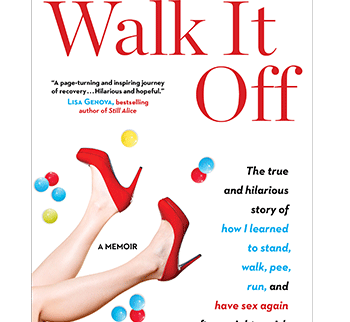Walk It Off by Ruth Marshall sits on the Toronto Star’s bestseller list, and is a Heather Reisman’s Pick.
This laugh-out-loud memoir, (published by Simon & Schuster) is full of heart and courage, inspiring readers to put their best foot forward and walk off anything life throws their way.
Marshall is a power mom and has been an actress for over 20 years. She is recognized for playing Darcy and Clare Edwards’s mother on the television show Degrassi: The Next Generation, Billy Ray Cyrus’s boss on Doc; and has acted in Hollywood films including Casino Jack and Dolores Claiborne. She continues to do voice-over work for radio and television.
READ: THE HILARIOUS TRIALS OF THE CLASS MOM
Back in 2012 the 47-year-old Toronto actress was balancing a thriving career and family life with two boys and husband Rich, when she lost her footing.
“I was at choir practice [Toronto Jewish Chorus] at synagogue and my choir colleague noticed I kept looking at my feet. They were tingling but I also had the sense that they had been doing that for a while and it was in the back of my mind that my feet were in constant pins and needles. That is when I first gave voice to it.
“I thought this might make the beginning of an interesting short story – I wondered if my tingling feet might be a metaphor for something. It sort of became a catalogue of symptoms and was something I ended up using to take to the doctor, unsure of what was going on. It kind of snowballed from there,” said Marshall.
She tried to brush it off, even as she tripped over curbs and was stumbling into people.
“Clumsiness is charming, right? I was in denial. Things were getting much wonkier. I was running away from the possibility that there was actually something really bad going on that I couldn’t put my finger on.”
Eventually, Marshall did see her GP and neurologist.

“The neurologist said he could make an appointment for an MRI but he didn’t see this as an emergency. I told my mother this and she said, ‘You are going to Buffalo immediately.’ Then everything happened very quickly – I had the MRI and got the diagnosis 24 hours later,” recalled Marshall.
Marshall was diagnosed with spinal meningioma, a non-cancerous tumour on her spine. She was told it had been growing on her spine for at least 10 years. It was sitting on her proprioceptive nerve, the nerve that tells your body where it is in space.
“Spinal meningioma is usually very innocuous. It can sit on your spine your entire life. Mine didn’t follow the rule book in any way. It grew and grew, got hard, stuck to my spine, and wrapped around it,” explained Marshall.
Following surgery Marshall had no sense of where her legs were. She had to earn how to walk again, use the washroom and have sex again.
“Your nerves just don’t respond the way they used to because they have been severely rattled. The spine does not like to be touched ever and it was touched for hours and hours. The hardest part was learning how to walk, learning to figure out exactly what my legs and feet were supposed to even do and how they were supposed to move. It was all very mysterious to me,” said Marshall.
The prognosis, although hopeful, was not certain that she would walk again.
“I didn’t lose faith. I did what I had to do. I took little bites. Can I move my toes today? Oh that’s good, I saw a toe move.
“In the hospital and then in rehab I kept a journal, which is something I had never really done before. It was a way to process what was happening to me and a dumping ground so that I could take the pressure off my family and friends. I wrote until my final MRI about a year later – by that point I was pretty damn certain I had a book,” said Marshall.
Marshall’s recipe for living: a sense of humour, a purpose and something to look forward to.
“I’m never going to go back to the way I was before. It’s taken me a while to make peace with that. The gift of this whole experience was how much remained the same rather than how much it changed. I was able to get back to my life. It’s a very gratifying feeling,” concluded Marshall.
